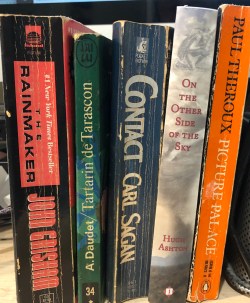The prompt to our writing group was: “Child’s play: Write about a character that finds a toy from their childhood – what memories does it conjure up?”
I think what the author of this prompt would expect many people would write about the discovery of a beloved old teddy bear in the attic or in a box while they were cleaning out their deceased parents’ home, and the memories of happy days playing in the garden. But for some reason, my imagination took a darker turn.
The story basically wrote itself, and when I had finished, I looked back over the nearly 800 words, and thought “That’s actually not bad at all”. There’s quite a lot packed into there, and I could expand it a little, but I chose not to do so – it seemed to me that it would be just padding.
Anyway, for what it’s worth, here’s Doddy (the name is a child’s mangling of “Dolly”). I’ll be interested to know what you make of it.
It had been a long time since Jane had gone up into the attic. She would never have gone if it hadn’t been for her nephew who had wanted to see the photograph of Aunty Jane playing on the wall outside the house where she had lived in Scotland all those years ago.
As she stepped through the trap door and started to hunt through the pile of dusty cardboard boxes for the album containing the photo, her eye was caught by a familiar face. Or, rather, a face that had once been almost as familiar as her own.
Doddy – the once-loved, once-discarded, but never-forgotten companion of her childhood. The one who never pulled her hair or called her names, or who said rude things about her when her back was turned and they pretended she wasn’t listening so they could say whatever they wanted about her.
She’d repeat these back to Doddy when she got home. The words seemed to lose some of their sting when there was someone else to hear them – even if it was just Doddy. Looking at that battered face now, the words came back to her again. Words she hadn’t heard for years now – not since she’d gone to university, taken her degree and her doctorate and climbed the academic ladder to her present position.
And along with the words came a flood of guilt. Doddy’s face was distorted almost beyond recognition, but it wasn’t the result of being loved almost to death, like the teddy bear sitting placidly beside her. As Doddy had absorbed the jealousy and hate passed on to her by Jane, she had in her turn become the victim of Jane’s supressed rage and frustration – not just a metaphorical, but a literal punching-bag. There had been nights when Jane’s fists had been sore, almost bleeding, as the result of the violence inflicted on the defenceless Doddy.
Doddy didn’t deserve that, her forty-five year old self said. You should be ashamed of what you did then.
Oh yes she did deserve it, the eleven-year old Jane replied. She never gave you a word of comfort or contradicted the lies that the other girls spread about you. Quite honestly, you should have burned her years ago. The bin’s too good for her.
While this debate was raging in her head, her body was unconsciously still searching for the photograph to show to her nephew, Alex. The album containing it appeared at the bottom of a box, and she picked it up. As she did, she noticed that she was gripping Doddy tightly in her other hand. She had no recollection of her finger and thumb encircling the doll’s neck in a death grip, strangling the life out of her.
Don’t be so daft, she told herself. Dolls don’t have life. You can’t strangle them.
Oh yes she does, and you can, said her other self.
She made her way down the ladder with the album in one hand and Doddy in the other.
Alex gave the photo a cursory glance, now appearing to be far more interested in Doddy, despite his earlier expressed wish to see the picture.
“Poor thing,” said Alice, her sister-in-law, looking at Doddy. “You must have loved her very much for her to be all out of shape like that. You know what? It would be lovely for our Emily to have her to be loved. Two generations taking care of her.”
“No,” Jane said. Just that. No.
“Oh?”
Jane felt obliged to give an answer. “I think she’s got some sort of mould running all through her, look.” She pointed to an invisible imaginary point on the doll’s torso. “And here. Best thing, sad though it is, is to burn her, to stop it spreading.”
“Can we really burn her, Aunty Jane? Can I help?” Alex asked excitedly.
Jane smiled inwardly. There was obviously some kindred spirit at work here. “Of course, Alex. Come with me.”
In the garden shed there was a bottle of methylated spirit. There was a box of matches that she used to start bonfires. And there was a brazier to hold the bonfires. Within minutes Doddy was an unrecognisable pile of charred rubbish.
She felt free. No longer did she have to wear the role and the academic robes of Professor Dame Jane Silverton CBE of the Department of Neurophysiology at the University of Farnsworth, knighted for her ground-breaking work on the treatment of Alzheimer’s disease, but she could now exist as Jane Silverton. No titles, no honours. Just plain Jane.
She turned away from the funeral pyre towards the house.
“Come on, Alex. Help me make some cheese scones for tea.”




















